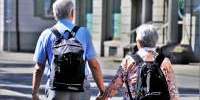Seniors staying involved in the communities of Berettyóújfalu district
Abstract
The Health Promotion Office in Berettyóújfalu and the Social Service Center of Bihar organised a program series, containing six sessions in seven locations for people over 65 years. The purpose of the lifestyle change program were to help the elderly overcome the difficulties caused by the coronavirus pandemic, besides keeping them involved in the community. Since the elderly were the most vulnerable group during the COVID-19 pandemic, most of them followed the rules of social distancing and reduced the number of personal contacts or even avoided them entirely. However, some of the elderly did not understand the control measures, so their implementations were unsuccessful. As our clients mentioned the mental difficulties was the biggest problem. Those were caused by fear of the COVID-19 disease, lack of personal contacts and grief. The participants had problems with the changed function of the health care system and to accept it. The main topics of our program were hand hygiene, primary prevention and different dimensions of health. Additional tasks included coping methods for acute emotional crisis, the establishment and strengthening of a healthy lifestyle and a positive outlook on life. We reached 8.52-17.12% of the elderly population in covered areas. Overall, the most significant result of the program was that there were no dropouts among the participants, who were at the most vulnerable group – regarding the COVID-19 – and that they received help to solve their everyday problems and improve their quality of life.
References
A 290/2014. (XI. 26.) Korm. rendelet a kedvezményezett járások besorolásáról. https://net.jogtar.hu/jogszabalyocid=a1400290.kor Megtekintve: 2022. 12. 06.
A 86/2019. (IV. 23.) Korm. rendelet a fővárosi és megyei kormányhivatalokról, valamint a járási (fővárosi kerületi) hivatalokról. https://net.jogtar.hu/jogszabaly?docid=a1900086.kor Megtekintve: 2022. 12. 06.
Altay, B. és Çalmaz, A. (2022). Perception of loneliness and life satisfaction in the elderly during the COVID-19 pandemic process. Psychogeriatrics: The official journal of the Japanese Psychogeriatric Society. https://doi.org/10.1111/psyg.12911
Bass, C. (szerk.) (1990). Somatization: Physical symptoms and psychological illnes. Backwell Scientific Publications.
Bentlage, E., Ammar, A., How, D., Ahmed, M., Trabelsi, K., Chtourou, H. és Brach, M. (2020). Practical recommendations for maintaining active lifestyle during the COVID-19 pandemic: A systematic literature review. International Journal of Environmental Research and Public Health, 17(17), 6265. https://doi.org/10.3390/ijerph17176265
Callow, D. D., Arnold-Nedimala, N. A., Jordan, L. S., Pena, G. S., Won, J., Woodard, J. L. és Smith, J. C. (2020). The mental health benefits of physical activity in older adults survive the COVID-19 pandemic. The American Journal of Geriatric Psychiatry: official journal of the American Association for Geriatric Psychiatry, 28(10), 1046–1057. https://doi.org/10.1016/j.jagp.2020.06.024
Ember, I., Kiss, I. és Cseh, K. (szerk.) (2013). Népegészségügyi orvostan. Pécsi Tudományegyetem, Általános Orvostudományi Kar.
Ferenci, T. (2020). Az első hullám tapasztalatai. Index.hu https://index.hu/velemeny/olvir/2020/05/18/koronavirus_jarvany_magyarorszag_elso_hullam_tapasztalatok_sikeres_intezkedesek_hibak_ferenci_tamas/ Megtekintve: 2022. 11. 25.
Gholipour, E., Vizvári, B., Babaqi, T., és Takács, Sz. (2021). Statistical analysis of the Hungarian COVID-19 victims. Journal of Medical Virology, 93(12), 6660–6670. https://doi.org/10.1002/jmv.27242
Hajduska, M. (2015). Krízislélektan. ELTE Eötvös Kiadó.
Kopp, M. és Skrabski, Á. (2009). Magyar lelkiállapot az ezredforduló után. Távlatok, 19(86), 32–52. Megtekintve: 2022. 11. 25.
Központi Statisztikai Hivatal. (2021. 11. 18.). Testmozgás, 2019. https://www.ksh.hu/docs/hun/xftp/idoszaki/elef/testmozgas_2019/index.html#nttamunkjukatlvevgzkarnya Megtekintve: 2022. 11. 25.
Központi Statisztikai Hivatal. (2021. 11. 24.). Szubjektív jóllét, mentális egészség, 2019. https://www.ksh.hu/docs/hun/xftp/idoszaki/elef/szubjektiv_jolet_2019/index.html Megtekintve: 2022. 11. 25.
Központi Statisztikai Hivatal. (2017). Népszámlálás – 2011. Területi adatok – Hajdú-Bihar megye. 4.1.2.1 A népesség korcsoport és nemek szerint, 2011. https://www.ksh.hu/nepszamlalas/tablak_teruleti_09 Megtekintve: 2022. 11. 25.
Központi Statisztikai Hivatal. (2021. 11. 17.). Egészségi okból fakadó korlátozottság, 2019. https://www.ksh.hu/docs/hun/xftp/idoszaki/elef/korlatozottsag_2019/index.html Megtekintve: 2022. 11. 25.
Központi Statisztikai Hivatal. (2022a). 4.1.2.10. Egészségesen várható élettartam régió szerint [év]. https://www.ksh.hu/stadat_files/ege/hu/ege0053.html Megtekintve: 2022. 11. 25.
Központi Statisztikai Hivatal. (2022b). 20.1.2.8. Munkanélküliségi ráta, megye és régió szerint [%]. https://www.ksh.hu/stadat_files/mun/hu/mun0083.html Megtekintve: 2022. 11. 25.
Központi Statisztikai Hivatal. (2022c). 4.1.2.3. Háziorvosok és házi gyermekorvosok megye és régió szerint, december 31. https://www.ksh.hu/stadat_files/ege/hu/ege0046.html Megtekintve: 2022. 11. 25.
Kristenson, M., Kucinskienë, Z., Bergdahl, B., Calkauskas, H., Urmonas, V. és Orth-Gomér, K. (1998). Increased psychosocial strain in Lithuanian versus Swedish men: the LiVicordia study. Psychosomatic medicine, 60(3), 277–282. https://doi.org/10.1097/00006842-199805000-00011
Nagy, E. M. (2021). Cikkismertetés: A fizikai aktivitás jótékony hatásai az időskori mentális egészségre a Covid–19-járvány idején. Egészségfejlesztés, 62(2), 62–63. https://doi.org/10.24365/ef.v62i2.5912
Oliveira, M. R., Sudati, I. P., Konzen, V. M., de Campos, A. C., Wibelinger, L. M., Correa, C., Miguel, F. M., Silva, R. N. és Borghi-Silva, A. (2022). COVID-19 and the impact on the physical activity level of elderly people: A systematic review. Experimental Gerontology, 159, 111675. https://doi.org/10.1016/j.exger.2021.111675
Perczel-Forintos, D. (2020). A jót keresd, ne a rosszat – megküzdés járvány idején. A COVID–19 pszichés hatásai. Orvosképzés, 95(3), 562–569.
Tringer, I., Osváth, P., Ozsváth, K., Tényi, T. és Fekete, S. (2021). Szomatoform (szomatikus tünet) zavarok. In Németh, A., Füredi, J., Lázáry, J. és Somlai Zs. (szerk.) A pszichiátria magyar kézikönyve (pp. 324–336), 6. átdolgozott és bővített kiadás. Medicina Könyvkiadó.
Uzzoli, A., Kovács, S. Zs., Páger, B. és Szabó, T. (2021). A hazai COVID-19-járványhullámok területi különbségei. Területi Statisztika: a Központi Statisztikai Hivatal folyóirata, 61(3), 291–319. https://doi.org/10.15196/TS610302

Copyright (c) 2022 József Roland Mezei

This work is licensed under a Creative Commons Attribution-NonCommercial 4.0 International License.


